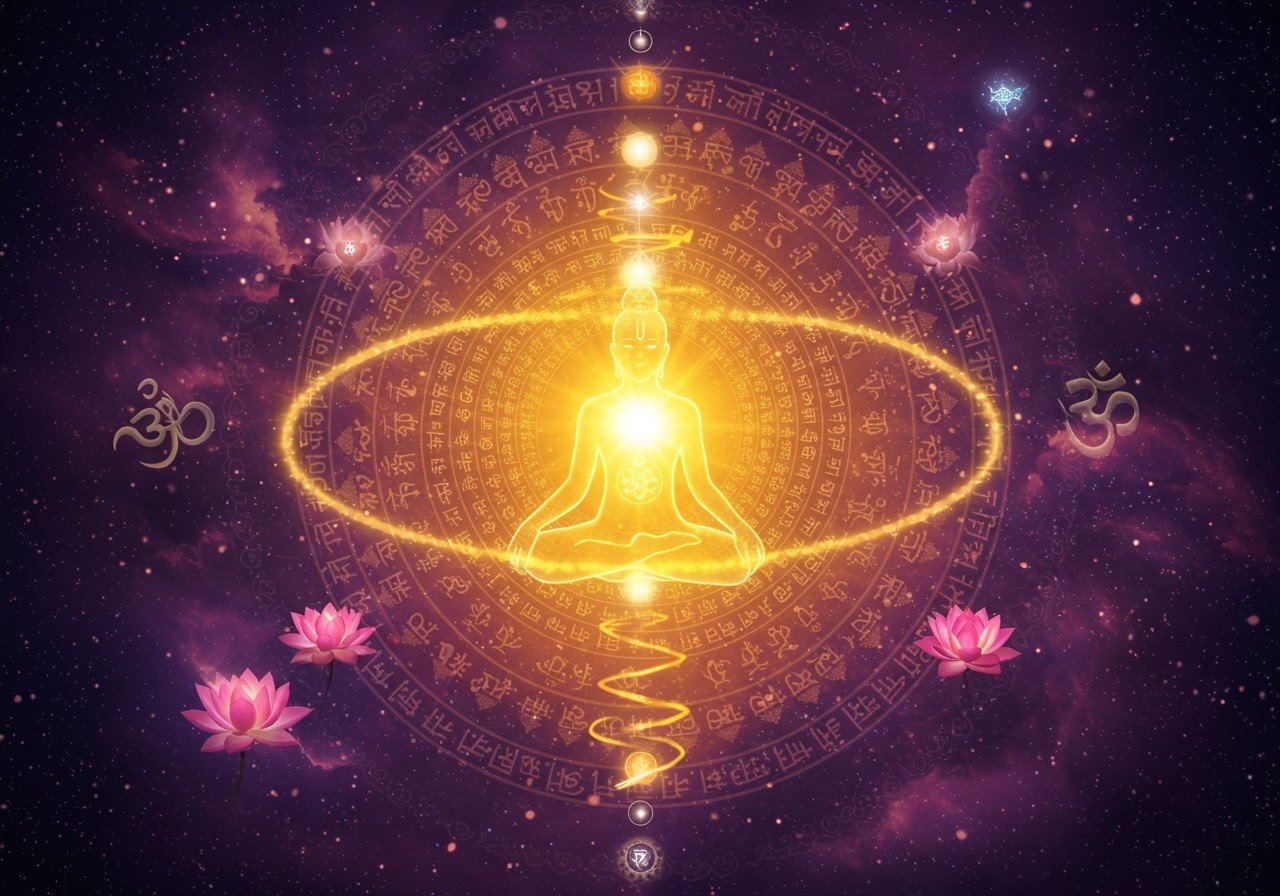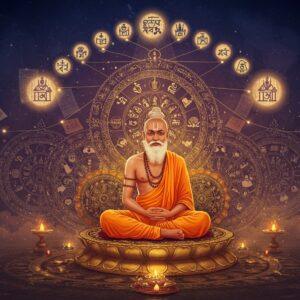Ishvara and Brahman: Exploring the Divine in Advaita Vedanta

The concepts of Ishvara and Brahman are central to Advaita Vedanta, a profound school of Hindu philosophy. Understanding these can enrich your spiritual journey and deepen your appreciation for cultural heritage. Advaita Vedanta teaches the oneness of the individual soul (Atman) and the ultimate reality (Brahman). Ishvara, the personal God, helps devotees grasp this ultimate truth, acting as a guide in their spiritual exploration.
Understanding Brahman in Advaita Vedanta
Brahman is the ultimate, unchanging reality in Advaita Vedanta. It is without attributes and transcends the physical world. Brahman is the source of everything, existing beyond time, space, and causation. The phrase “Tat Tvam Asi” (That Thou Art) highlights the non-dual nature of Brahman and Atman. Brahman is seen as Nirguna, without qualities, a concept that challenges our human desire for relatable traits. This concept is experienced through deep meditation and realization, not merely intellectual understanding.
The Role of Ishvara in Advaita Vedanta
Ishvara represents the Saguna aspect of the divine, meaning with qualities. These qualities include omniscience, omnipotence, and benevolence. As the creator, preserver, and destroyer of the universe, Ishvara holds a significant place in Advaita Vedanta. Ishvara serves as a more accessible form of the divine. Devotees find comfort in Ishvara’s presence, offering a pathway to connect with the ultimate reality, Brahman. This connection is crucial for spiritual seekers on their path to self-realization. Immanence and transcendence define Ishvara’s existence. While present within the world, Ishvara also transcends it, bridging the material and spiritual realms. Ishvara is a manifestation of Brahman, guiding individuals towards the understanding of non-duality.
Ishvara and Brahman: Exploring the Connection
The relationship between Ishvara and Brahman is nuanced. Ishvara represents the interactive aspect of Brahman with the world. Through meditation, devotion, and knowledge, individuals realize the unity of Ishvara and Brahman. A common metaphor describes Ishvara as a reflection of Brahman in the mirror of Maya (cosmic illusion). Realizing this oneness leads to Moksha, or spiritual liberation. Ancient texts and teachings illuminate this profound connection. For a deeper understanding, explore our collection of sacred texts at Poojn.in. We offer a wide variety of scriptures, including the Upanishads and Bhagavad Gita, which discuss the relationship between Ishvara and Brahman.
Is Ishvara Brahman? A Philosophical Inquiry
A common question arises: is Ishvara synonymous with Brahman? In Advaita Vedanta, Ishvara acts as a conceptual tool to help individuals grasp the formless, attributeless Brahman. Ishvara exists within the realm of Maya, facilitating spiritual progress. Adi Shankaracharya’s teachings emphasize Ishvara’s role in guiding seekers toward non-duality. As one dissolves the ego, they understand that Ishvara and Brahman are not separate but one. Discover more about these concepts with our curated collection of books and resources at Poojn.in.
The Practical Implications of Understanding Ishvara and Brahman
Understanding these concepts has a significant influence on personal spiritual practices. It affects meditation, rituals, and ethical living. Realizing non-duality fosters unity and compassion toward all beings. This knowledge brings inner peace and detachment from material concerns. Advaita Vedanta’s teachings enhance appreciation for traditional rituals and their symbolism. Embracing these concepts enriches both spiritual journeys and cultural heritage. Enhance your spiritual practice with meditation supplies from Poojn.in. We offer comfortable asanas, meditation cushions, and prayer beads (malas).
How Poojn.in Supports Your Spiritual Journey
Poojn.in offers essential items for worshipping and understanding Ishvara and Brahman in the Advaita Vedanta tradition.
- Sacred Texts: Find authentic copies of Vedantic texts like the Upanishads and Bhagavad Gita, which delve into the profound relationship between Ishvara and Brahman. These texts provide invaluable insights into the core principles of Advaita Vedanta, guiding you on your spiritual path.
Explore Hindu scriptures here. - Puja Items: Get complete puja sets and individual items needed for daily worship of Ishvara in various forms, including brass and copper diyas, pure cotton wicks, high-quality incense sticks, and traditional bells and conch shells. These items help create a sacred atmosphere conducive to worship and contemplation. Shop for puja items here.
- Divine Idols: Choose from our collection of carefully crafted murtis of different deities who represent various aspects of Ishvara, including Lord Shiva statues in bronze and brass, Krishna idols in different sizes, and Vishnu murtis with traditional details. These murtis serve as focal points for devotion and meditation. Browse our divine idol collection here.
Visit Poojn.in to explore our complete collection of authentic ritual items. We offer secure packaging, reliable delivery across India, and expert guidance on product selection.
Embracing the Wisdom of Ishvara and Brahman
In the rich tapestry of Advaita Vedanta, the connection between Ishvara and Brahman offers profound insights. By understanding this relationship, individuals embark on a transformative journey. The wisdom of Ishvara as a reflection of Brahman guides seekers toward self-realization and non-duality. This journey is not just philosophical; it offers practical benefits, deepening meditation practices, enriching rituals, and fostering a sense of unity with all life. Embracing these teachings helps balance the spiritual and material aspects of life, enhancing one’s appreciation for traditional practices. As spiritual seekers integrate these concepts, they find peace and fulfillment. The path of Advaita Vedanta, illuminated by the roles of Ishvara and Brahman, remains a timeless guide for those seeking harmony and enlightenment.
Understanding Ishvara and Brahman in Advaita Vedanta
Is Ishvara the same as Brahman? In Advaita Vedanta, Ishvara is considered the personal form of Brahman, the ultimate reality. Brahman is the absolute, formless, and infinite consciousness, while Ishvara is Brahman with attributes, providing a more relatable form for devotees to connect with. This distinction helps bridge the gap between the abstract concept of Brahman and personal spiritual practice.
How are Ishvara and Brahman connected in Advaita Vedanta? Advaita Vedanta teaches that Ishvara is a manifestation of Brahman. While Brahman is beyond human comprehension in its pure form, Ishvara represents Brahman in a way that can be worshipped and understood. This manifestation allows individuals to engage with the divine in a meaningful way.
Why does Advaita Vedanta emphasize the unity of Ishvara and Brahman? Advaita Vedanta emphasizes this unity to highlight that all forms of God are ultimately one. This core belief encourages followers to see beyond physical forms and comprehend the underlying oneness of all existence. It promotes a sense of interconnectedness and universality.
What is the role of Ishvara in Advaita Vedanta? Ishvara plays the role of creator, preserver, and destroyer of the universe. Within Advaita Vedanta, Ishvara guides individuals toward realizing the ultimate truth of Brahman. This guidance is essential for navigating the spiritual path.
How does one worship Ishvara in Advaita Vedanta? Worship of Ishvara can involve devotion, rituals, and meditation. Through these practices, devotees aim to attain a deeper understanding of and union with Brahman. These practices cultivate a connection with the divine.
Can one achieve enlightenment by understanding Ishvara and Brahman? Yes, understanding the relationship between Ishvara and Brahman is considered a crucial step towards enlightenment. Realizing that Ishvara is a form of Brahman helps individuals transcend duality and realize their true nature. This realization is a cornerstone of Advaita Vedanta.
What is the significance of Ishvara in daily spiritual practice? Ishvara provides a relatable form for practitioners to focus their devotion and meditation. This connection with Ishvara helps individuals maintain their spiritual discipline and progress toward realizing Brahman. It offers a tangible aspect to an otherwise abstract pursuit.
Does Advaita Vedanta reject the worship of deities other than Ishvara? No, Advaita Vedanta does not reject the worship of other deities. It teaches that all deities are ultimately manifestations of the same Brahman, allowing for diverse forms of worship while maintaining the core belief in oneness. This inclusivity embraces the varied expressions of the divine.


